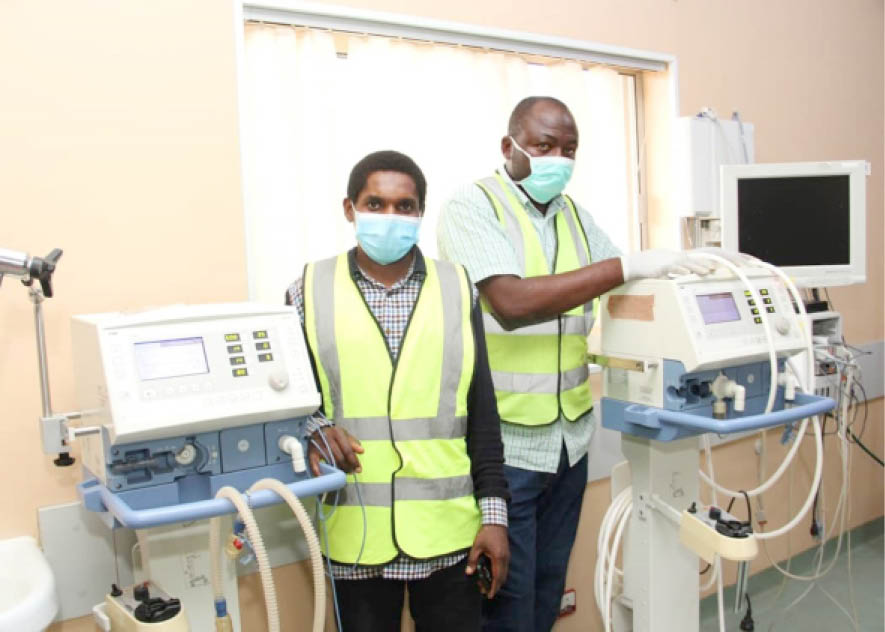‘We had never seen a ventilator before we fixed them at JUTH’
William Gyang and Nura Jibrin, both Jos-based engineers are being celebrated as heroes across Nigeria after they volunteered and fixed two broken ventilators at the Jos University Teaching Hospital. Ironically, before March 22, they had never heard of a ventilator and before they fixed the ones at JUTH, they had never actually seen any. This […]

Nura Jibrin and William Gyang next to the ventilators they fixed
William Gyang and Nura Jibrin, both Jos-based engineers are being celebrated as heroes across Nigeria after they volunteered and fixed two broken ventilators at the Jos University Teaching Hospital. Ironically, before March 22, they had never heard of a ventilator and before they fixed the ones at JUTH, they had never actually seen any. This is the remarkable story of how the two men were moved to save lives in the fight against the covid-19 pandemic.
On March 22, William Gyang turned on his TV to watch the news in Jos and was inundated by the coverage of coronavirus pandemic. Seeing how overwhelemed the world is, Gyang wondered how he could contribute to save lives.
“Some were crying and asking for ventilators to save lives of infected individuals in their countries,” Gyang recalled of the news he watched that day. “I wished I were a medical doctor, I would have participated with all my energy to save human lives.”
But Gyang holds a diploma in Electrical and Electronic Engineering from Plateau State Polytechnic and thought he could apply his skills somehow to help the situation.
“I heard President Donald Trump, of US saying the infection among Americans is rising by the day and they needed ventilators to save lives. I asked myself, what are ventilators so that possibly if studied, I can fabricate new ones to help in the on-going fight against the disease,” he said.
He started researching on ventilators, what they are, what they look like and how they work?
“I have never seen a ventilator in my life before now but through my research, I was able to understand both the electrical and mechanical parts of the ventilator, “ he said.
After his research, Gyang invited his friend, Nura Jibrin, also an engineer who wanted to help and together they went to the Jos University Teaching Hospital (JUTH) and asked the Chief Medical Director if they could get their faulty ventilators to fabricate new parts for the machines.
The CMD, Dr. Edward Benwat was impressed by Gyang’s boldness and willingness to contribute to the fight against covid-19 but he had doubts about the efforts of both Gyang and his friend, Nura Jibrin because they had no experience with the machines.
“When the two young men approached us on the need to have a look of the sample of a ventilator to enable them fabricate new ones, the management of the hospital was surprised to hear people who have never seen a ventilator but have the courage to fabricate it,” Dr. Benwat said.
“I asked him his qualifications and further said to myself, let me give him a trial. They were led to a room where the faulty ventilators were kept, “he said.
A trial was all the engineers needed.
“I accessed them and realised that some of them can be fixed,” Gyang said. “I haven’t in my life repaired something of that nature before but was confident that something can be done.”
Alongside Jibrin, the two men worked on the ventilators and were able to repair two of the three. Getting new ventilators like that would have cost the hospital N50m.
Buoyed by their success, the duo said they are still working on fixing the third one.

No one appreciates their services more than the CMD.
“For now, ventilator is one of the highly required medical facilities worldwide which makes it more expensive and difficult to get. To cut it short, ventilators are not even available in the world even if an order is placed because countries including the affected ones like U.S, where the disease is prevalent are placing orders on daily basis to Safeguard the lives of their citizens against the novel pandemic,” Benwat said.
Jibrin said they fixed the machines at no cost to the hospital as they only wanted to contribute and save lives.
“This is a humanitarian services that every Nigerian should offer. One can offer such services through different means. You must not be a doctor before you contribute. The disease doesn’t look at your ethnicity, age, region or religion. There is urgent need for people to consolidate on the existing efforts toward stemming the outbreak and spread of the disease,” he said.
With over 200 confirmed cases at the moment in Nigeria, and rising numbers on a daily bases, the need for ventilators will rise in the next few weeks and many lives are going to depend on them.
In a divided city like Jos, the fact that Gyang is Christian and Nura is Muslim did not escape notice as both demonstrated how much people from both sides of the divide could achieve if they worked together. The fact did not escape the duo.
“We are of different faith that didn’t prevent us from coming together as one to do what is beneficial to all irrespective of any difference,” Jibrin said. “We are here today to ensure that our service to humanity is a reality. People’s lives, worldwide and especially Nigerians are important to us and we shall continue to do more through other means. It is collective efforts that everyone should contribute to.”
The two became friends during their days at Government Technical College Bukuru and according to Gyang, they have maintained that friendship despite the many ethno-religious conflicts that pitted their various identities against each other.
For all the people whose lives would be saved on account of their work, that would mean everything.
